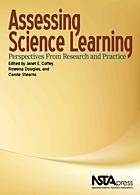Bridging Assessment Research and Practice
Project 2061 contributes to NSTA book on K–12 science assessment
Assessment is a central part of science education today, but understanding assessment's many forms and purposes requires insights gleaned from multiple points of view. The teacher in the classroom, the researcher focused on particular strategies, the developer of state-level tests, the teacher educator looking at the relationship between professional development and student achievement—the perspectives of these educators and others shape the national dialogue on how assessment can best help students learn science.
Project 2061’s team of assessment researchers has once again added their voice to this dialogue by contributing to a new collection of essays from NSTA Press. Assessing Science Learning: Perspectives From Research and Practice tackles the complexity of science assessment by foregrounding the need for conversation among researchers and practitioners. The essays grew out of two conferences convened by NSTA to help bring National Science Foundation-funded research findings about assessment to a larger audience of practitioners. The book invites science teachers to reflect on their own practice and to join the larger conversation.
Editors Janet Coffey and Carole Stearns call for expanding teachers’ participation in assessment discussions at the state and locals levels, and in assessment research. While researchers can offer approaches and frameworks for teachers to integrate into their work, practitioners can shed light on classroom dynamics and on how they make decisions as they juggle “competing priorities and purposes” (Coffey & Stearns, 2008, p. xii).
Project 2061’s chapter, “Assessment Linked to Science Learning Goals: Probing Student Thinking Through Assessment,” introduces readers to a procedure for developing assessment items. Project 2061’s procedure involves three stages: (1) clarifying the targeted content standard, (2) designing assessment tasks that are precisely aligned to the specific ideas in the targeted content standards, and (3) using data derived from one-on-one interviewing and pilot-testing items with students to improve the items’ effectiveness. Deputy Director George DeBoer and his team then detail how their pilot-testing of multiple-choice items brings student voices into the assessment conversation.
Project 2061’s researchers describe how they gather data from interviews with students and pilot tests of items in which students’ answer choices are compared to the explanations they give for their answers. With the help of example items from key topics (e.g., Atoms, Molecules, and States of Matter; Plate Tectonics; and Controlling Variables), they show how they identify factors that affect how well a test item measures what students know about a particular idea. Based on the results of the pilot testing, the Project 2061 team revises the items and continues to refine them through national field tests.
In keeping with the book’s theme of bridging research and practice, Project 2061’s contribution to Assessing Science Learning also makes clear that high-quality assessment items that are closely linked to the ideas in science standards can meet the needs of teachers, test developers and test administrators, curriculum developers and researchers, and parents and other members of the public.
Read the full chapter: Assessment Linked to Science Learning Goals: Probing Student Thinking Through Assessment [PDF]
Learn more about Project 2061’s assessment research and development.
For additional information or to purchase Assessing Science Learning: Perspectives From Research and Practice, and other books from NSTA Press, visit the NSTA Science Store at www.nsta.org/store.
# # #
For more information about Project 2061’s assessment work, please contact:
Principal Investigator: Dr. George DeBoer, (202) 326-6624.
References
Coffey, J., & Stearns, C. (2008). Introduction. In J. Coffey, R. Douglas, & C. Stearns (Eds.). Assessing science learning: Perspectives from research and practice (pp. xi-xvi). Arlington, VA: NSTA Press.
DeBoer, G. E., Herrmann Abell, C., Gogos, A., Michiels, A., Regan, T., & Wilson, P. (2008). Assessment linked to science learning goals: Probing student thinking through assessment. In J. Coffey, R. Douglas, & C. Stearns (Eds.), Assessing science learning: Perspectives from research and practice (pp. 231–252). Arlington, VA: NSTA Press.
Also in the July/August 2008 issue:





